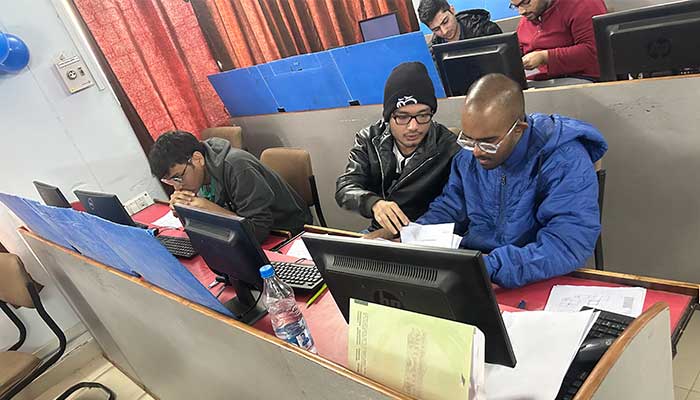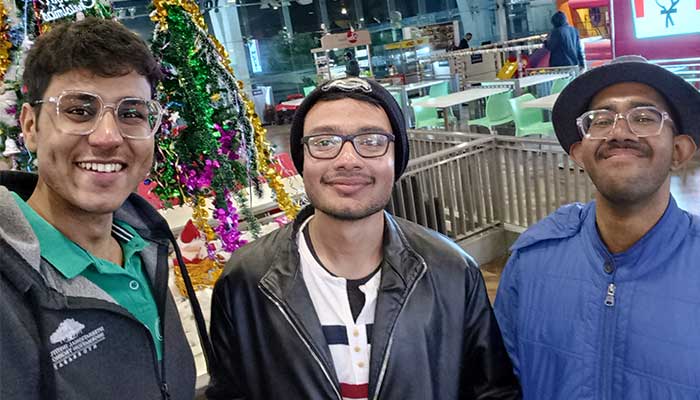With more than 50,000 students in more than 3,000 universities from 111 countries taking part in it each year, it is the oldest, largest, and most prestigious programming competition in the world. Here’s how a team of 3 from IIITH have earned their bragging rights by making it to the finals of the International Collegiate Programming Contest (ICPC).
The ICPC is no ordinary coding competition. It is a grand sporting event of the mental kind where teams are judged based on the speed and number of algorithmic programming problems solved. The team effort stands out here because it debunks myths of programmers cracking code in isolation. IIITH’s students have been actively participating in the ICPC since 2012, qualifying as finalists a total of 12 times out of 14. This year has been no different.
Winning Run Explained
IIITH’s Team FLogic comprising of Amul Agrawal, Alapan Chaudhuri, and Aditya Verma beat nearly 1,500 teams from over 250 colleges in this exceptional run that included not only the best Indian teams from the top IITs, NITs and BITS but also a few of the best international teams. “Basically, in order to get to the world finals, you need to first clear a 3-hour long online preliminary round followed by a 5-hour long Indian Regional contest. With India coming in the Asia West region along with Bangladesh, Pakistan, Afghanistan, and Iran, the Indian Regional finalists get to compete in the Asia West Finals. The Asia West region typically gets around 15 slots to compete in the world finale,” explains Amul Agrawal patiently. IIITH’s Programming Club deconstructs the team’s trajectory even further by stating that they started with an impressive 17th place finish in the preliminary round and went into the Pune-Gwalior regional round with a lot of expectations riding on them. There, they secured a rank 10 finish and moved into the Asia West finals where they finished at the 4th position with an 8-problem solve. “No other team could solve more than that,” exclaim the admins of the club.

What In The Name!
FLogic traces its origin to a dialogue in a YouTube parody called “Hitler against Godel’s Theorem”.”There’s a point where Hitler gets vexed with logicians and shouts “F*** Logic” in frustration. When we saw this parody, we were immediately convinced that it should be our team name because of the sheer amount of irrational things we do during team contests,” grins Amul. When quizzed if irrationality is then their secret sauce, Aditya underscores the hard work that has gone in. “To achieve a respectable position, one must first master the fundamental algorithms from a broad range of topics, which can take several years. Once the basics have been covered, the level of preparation depends on how advanced a team wishes to go. Our team which was formed in our second year of college has been training hard for over two years before the competition, during which we covered a wide range of advanced topics.”
Personal Strengths, Group Efforts
To excel in ICPC, both individual and team expertise is essential. Each team member must ensure they are proficient in their areas of expertise so that they can efficiently solve problems during the team contest. “In our team, Alapan is highly skilled in Math and Geometry (even if he inadvertently submits incorrect solutions after solving a problem), Aditya is proficient in dynamic programming and graphs (and relies on copious amounts of RedBull before every regional), and I, besides debugging the chaotic and unintentional code produced by Alapan and Aditya, specialise in data structures and implementation,” says Amul. During the contest, each team is given a single PC to work on, meaning that one team member will be coding at any given time. Therefore, it is crucial to strategize and wisely allocate the PC time, deciding who solves which problems and how to keep each other motivated during the multi-hour contest. “To achieve this balance, we conducted several practice team contests, which allowed us to refine our strategies and ensure we were fully prepared for the competition,” remarks Amul.
IIITH and ICPC
IIITH has a vibrant coding culture on campus and the Programming Club has played a crucial role in fostering it. The club organises programming and ICPC training sessions throughout the year that help in piquing student interest in this mindsport. Thanks to these efforts, the institute has consistently been ranked among the top participating institutes in ICPC from across the country. “This speaks volumes about the impact that the Programming Club has had on our college’s academic and extracurricular activities,” says Aditya. Despite FLogic’s limited programming experience prior to college, the club’s active presence got them hooked and they have been passionate about algorithmic coding from the first year, actively participating in coding contests since then. “It was during this time that our seniors introduced us to the ICPC which sparked our interest and motivated us to delve deeper into this field. Furthermore, inspired by the impressive track record of IIITH in ICPC plus the mentorship and constant encouragement of Anurudh Peduri, our senior and ICPC World Finalist 2020, we were determined to continue the legacy and make a mark in this prestigious competition,” says Alapan.
As FLogic gears itself for the finale which will be held in November 2023 in Egypt, Amul signs off with an ode to friendship, attributing the team’s success up until now to the close bond they share as friends: “It has made the entire journey more enjoyable and made the ultimate goal of performing well in ICPC all the more worth striving for”.

Sarita Chebbi is a compulsive early riser. Devourer of all news. Kettlebell enthusiast. Nit-picker of the written word especially when it’s not her own.


Next post